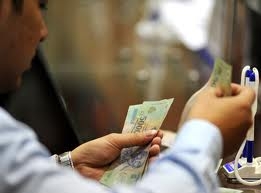Property credit valve is shut off
 Getting loans from foreign banks has become practically an impossible mission for Vietnamese real estate developers, while access to domestic banks is not widen enough. Nguyen Van Duc, deputy director of Dat Lanh Real Estate Company told VIR that he had tried to access loans from foreign banks but was rebuffed.
Getting loans from foreign banks has become practically an impossible mission for Vietnamese real estate developers, while access to domestic banks is not widen enough. Nguyen Van Duc, deputy director of Dat Lanh Real Estate Company told VIR that he had tried to access loans from foreign banks but was rebuffed.
“I think we [Vietnamese developers] have not got good relationship with foreign banks, as well as know-how and process how to get their loans as well,” Duc said.
Duc added that Vietnamese developers must actively improve themselves to meet foreign banks’ condition in order to have their loans in the future. Troy Griffiths, deputy managing director of Savills Vietnam, said that real estate companies like the rest of the economy are facing strong challenges.
“Those that are well managed will have structures in place to access debt and to continue for the long term. The weaker players who have not fully considered their future business position will of course suffer more,” Griffiths said.
He added that there were many avenues open to real estate companies for financing, both onshore and offshore.
“Traditional onshore debt may be available provided that collateral and servicing requirements are met. This is one of the key issues facing domestic real estate companies, that their collateral is presently misrepresented. Companies with good governance measures and accurate balance sheets will therefore be better positioned to win the race for capital,” he said.
Whilst debt may be more difficult to obtain, Griffiths said there were still options available through equity financing.
“There is equity available from throughout the region that can be directed to Vietnamese real estate companies. This can flow from joint ventures, partial buy-outs and share structuring,” he added.
Nguyen Nam Son, managing partner from Vietnam Capital Partners, told VIR that he did not think Vietnamese real estate companies could access lending from foreign banks, as foreign banks typically did not lend to Vietnamese companies even in good markets.
However, Son said Vietnamese real estate companies could access capital in the form of convertible bonds or equity, however, they must be large companies such as Hoang Anh Gia Lai or Vingroup.
“The reason they must be large is because you need to diversify in real estate, so a company must have a number of projects in order to diversify the project risk,” Son said.
Smaller real estate companies, he added, find it difficult at this point to access international capital unless they exhibit four qualities: very well-run companies, good management, good transparency, and a strong business plan.
However, for excellent companies, Son said this was a good time to prepare, so that when markets improve they could access capital.
“Preparation is critical because it takes significant time to prepare all of the four above factors. Very few real estate companies can access foreign capital because they lack only one of those factors,” Son said.
“The companies that can raise international capital will have a significant advantage over next five years. Choosing a knowledgeable investment bank with significant experience and a strong overseas reputation is critical for success,” he added.
Stephen Wyatt, country director of Knight Frank Vietnam, said it was difficult to envisage real estate developers gaining funds from foreign banks. The global economic situation, he said, has led banks all over the world to cut their lending and avoid risk.
“Unfortunately, Vietnam will be considered a risk to the majority of foreign banks and therefore they will have strict lending criteria, requiring the developer to demonstrate they have a strong track record and the financial muscle,” Wyatt said.
In addition, he added, foreign banks would require detailed market research and feasibility studies in order to ensure that any development is viable and constructed to international standards.
“Foreign banks are only likely to consider lending to prime developments and strong potential for future capital and rental growth,” he said.
What the stars mean:
★ Poor ★ ★ Promising ★★★ Good ★★★★ Very good ★★★★★ Exceptional
 Tag:
Tag:
Related Contents
Latest News
More News
- New rules ease foreign access to Vietnam equities (February 05, 2026 | 17:29)
- 0.1 per cent tax proposed on each transfer of digital assets (February 05, 2026 | 17:27)
- Ministry of Finance tightens policy delivery at start of year (February 05, 2026 | 17:26)
- Vietnam steps up market reforms as FTSE Russell reviews upgrade progress (February 05, 2026 | 17:20)
- 2025 profits mixed amid strong energy and farming results (February 05, 2026 | 17:18)
- Cashless payments hit 28 times GDP in 2025 (February 04, 2026 | 18:09)
- SSIAM and DBJ launch Japan Vietnam Capital Fund (February 04, 2026 | 15:57)
- Banks target stronger profits, credit growth in 2026 (February 04, 2026 | 15:43)
- Vietnam on path to investment-grade rating (February 03, 2026 | 13:07)
- Consumer finance sector posts sharp profit growth (February 03, 2026 | 13:05)





















 Mobile Version
Mobile Version